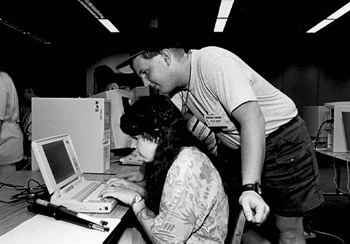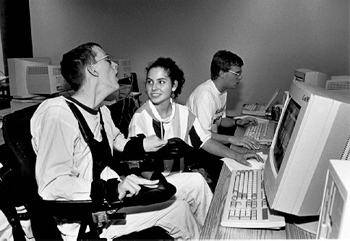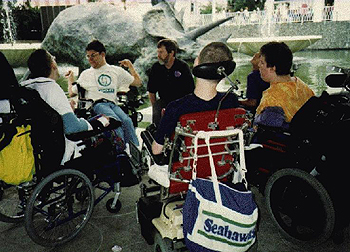DO-IT News December 1993

Volume 1, Number 4
Below are the articles of the DO-IT News December 1993 newsletter. These articles can also be seen all on one page at the Full Newsletter option.
Director's Digressions

As the holidays approach, I have noticed a glut of ads touting the joys of one type of computer over another or the delights of this software over the competitor's version. All of this emphasizes that technology is an important part of American culture.
This technology invasion is most evident when we look at how kids are learning. San Jose Mercury News columnist Joanne Jacobs writes, "Teachers won't be information-givers. Databases do it better. Instead, they'll help learners navigate oceans of data and search for pearls. This is known as going from the 'sage on the stage to the guide on the side.'" Professors and graduate students at the DO-IT Summer Program seemed to make the transition easily as they guided the talented group of high school DO-IT Scholars.
These kids proved that they were on the cutting edge of technology use. Not only did they use adaptive hardware and software to compensate for disabilities, but they made use of the Internet to tailor their own learning experiences. Students learn at their own pace and discover that a computer is not only patient, but able to jump to new subjects quite easily. Many applications also provide immediate feedback helping the student find and correct errors as they are made.
DO-IT Scholars participate in a weekly discussion group via the Internet and one team set up and monitors a bulletin board. Electronic-mail has proved to be one of the most useful tools in our computerized toolbox. Staff and students ask questions, forward interesting news tidbits, answer questions, set up tours, conduct interviews and just keep in touch by tapping messages on assorted keyboards.
Nadira, one of the DO-IT Scholars, managed to keep in touch with the DO-IT gang during her stay at Children's Hospital & Medical Center in September. Dan Comden, our adaptive technology consultant, worked with mentor and CHMC staffer Michael Herbert to set Nadira up with a portable system, modem and phone line so she could continue communicating with her DO-IT friends. Having the system helped her fill the hours during a difficult time.
1993 DO-IT Summer Program Evaluated
The 1993 DO-IT summer program was evaluated in order to discover participants' reactions--what they liked and disliked. The suggestions collected will be used to improve the program for next summer and will be shared with other organizations. To meet these goals, surveys were designed to collect relevant information from participants (via electronic-mail) and from others involved in the summer program (DO-IT staff, personal attendants, and volunteers).
Overall, responses were positive and many of the most popular presentations, labs and activities will be repeated next summer for a new group of DO-IT Scholars.
One favored activity was the sheep heart dissection where students learned about different types of heart surgery as they experimented. A dynamic physics demonstration also was popular because it helped bring complex concepts to a general audience through the use of video, discussion and demonstration. A chemistry lab where the students learned about recycling and then made their own slime was also a popular activity.
For evening and weekend activities, the Mariners game and Pacific Science Center trip were the clear winners. The Mariners won the game and a popular music group wrapped up the evening in the Kingdome where the participants were invited to dance on the turf. Students had several options at the Pacific Science Center and they enjoyed breaking into groups to explore at their own pace.
The evaluations also measured students' interest levels before and after the program. On average, respondents indicated an increased interest in science, mathematics and engineering.
Twentieth Computer Fair Announced
Mark your calendar to attend the largest and most comprehensive computer show in the Pacific Northwest. The 20th Annual UW Computer Fair, which attracts more than 18,000 visitors each year, will be held March 16 and 17 on the University of Washington campus. This event features more than 150 displays of the latest technology--networking, computer-aided design, image processing, desktop publishing, personal computers, workstations, applications software, and much, much more.
Exhibit hours are from 10 am to 8 pm on Wednesday, March 16, and from 9 am to 5 pm on Thursday, March 17. Fair activities take place in the HUB on the main campus of the University in Seattle. All fair activities are free and open to the public.
More than thirty free presentations focus on key issues involved in the application of computer capabilities. Some seminars explore technological advances that have an impact on how people use computers; others show how to implement computers in new and different ways in schools and businesses. Still other presentations summarize and demonstrate how computers can be used by individuals with disabilities.
As part of the fair, DO-IT Scholars, Mentors and staff from the Resource Center for the Handicapped will demonstrate adaptive technology that provides access to computers and network resources for individuals with a variety of disabilities. DO-IT will also sponsor a presentation and reception on Wednesday evening, March 16.
For twenty years, the UW Computer Fair has brought together professionals from the University and the community for presentations and demonstrations of state-of-the-art computer equipment, software, and support materials . . . and opportunities to win valuable door prizes! You won't want to miss this one!
DO-IT Scholars Recruited

The University of Washington is continuing efforts to recruit students with disabilities into science, engineering, and mathematics programs. Applications are encouraged from sophomores in high schools who wish to participate in the DO-IT (Disabilities, Opportunities, Internetworking and Technology) Scholars program. The DO-IT Scholars program helps participants increase their knowledge of science, engineering, and mathematics and gain prerequisite experience to enter these fields of study and employment. The National Science Foundation provides most of the financial support for this program.
The DO-IT Scholars Program
The DO-IT Scholars program consists of three phases. New applicants must apply for admission to Phase I. Admission to phases II and III are based upon successful completion of previous phases and a desire to continue participation as a DO-IT Scholar.
- Phase I
- Students accepted into Phase I will participate in the following activities.
- Internetworking
- DO-IT Scholars learn how to use computers to enrich their educations and explore career opportunities, through information access and communications with college students, faculty, and professionals, on the Internet network. Participants communicate electronically from home using computers, modems, software, Internet network connections, and, if necessary, special adaptive technology. Participants who do not have the required technology are loaned equipment and software for the duration of their participation as DO-IT Scholars. Previous experience working with computers is not required.
- Mentoring
- Through electronic communications, personal meetings, and joint projects using the Internet, DO-IT Scholars are brought together with Mentors (college students, faculty, and practicing engineers and scientists, most with disabilities themselves), to facilitate academic, career, and personal achievements. Participants are matched with several Mentors based on shared interests, however, communication with all mentors is encouraged.
- Summer Study
- During a two-week live-in summer program held on the Seattle campus of the University of Washington, DO-IT Scholars study science, engineering, and mathematics and are introduced to college dorm life and campus services. DO-IT Scholars participate in lectures and labs using computer applications, educational software, electronic mail, and resources on the Internet network. Subjects studied by 1993 participants include: oceanography; heart surgery; chemistry; virtual reality; adaptive technology; geophysics; material sciences, civil, mechanical and electrical engineering; mathematics; software training; biology; physics; astronomy; and climatology. Meals and housing are provided for participants and personal care attendants. Accommodations to facilitate a successful academic experience, such as interpreters for those with hearing impairments, are provided.
- Other Activities
- Throughout the year, DO-IT Scholars and Mentors are invited to participate in science-related activities hosted by the University of Washington, corporations, and other organizations. This years' events included University of Washington Computer and Health Sciences Fairs, lectures, the Westinghouse Science Competition, and a personal visit with Dr. Stephen Hawking.
- Phase II
- Upon admission to Phase II of the DO-IT Scholars program, participants apply their skills and knowledge to independent science projects and return the following year, to the UW campus, for a one-week summer program. Phase II participants also act as mentors to incoming DO-IT Scholars.
- Individual Projects:
- Phase II DO-IT Scholars design and complete independent science projects based on their individual interests. DO-IT Mentors and staff act as resources and provide assistance for participants in planning and completing projects. Individual projects currently pursued by 1993 Phase II participants include planning and organizing a tour of Battelle Pacific Laboratories; designing a computer-based CHAT system; working on virtual reality projects; evaluating software; and contributing to an electronic information service.
- Summer Study
- Phase II DO-IT Scholars return to the University of Washington campus during a one-week, live-in summer program. Participants are given the opportunity to develop knowledge, skills, and interests gained in the previous year by working on joint science projects with faculty and other professionals.
- Mentoring
- In addition to continuing their current mentor relationships, Phase II participants are given the opportunity to develop and practice communication and leadership skills by acting as peer Mentors for Phase I participants, face-to-face during the summer study program and electronically.
Phase III DO-IT Scholars who complete phases I and II are eligible for Phase III which includes opportunities to be individual contributors to the DO-IT program through activities agreed to by each participant and DO-IT staff. Specific mentoring responsibilities, scientific resource management, system administration, newsletter editing, working in the summer programs and other DO-IT sponsored events are several of the possible options.
Application Process: Students with disabilities in the Northwest region (Alaska, Idaho, Montana, North Dakota, Oregon, and Washington), who have an interest in science, engineering, or mathematics as a career, are encouraged to apply during their sophomore year of high school. Freshmen and juniors are considered on a space-available basis. Previous experience working with computers is not required to enter the DO-IT program. A complete application consists of three forms. (1) student application, (2) recommendation from a high school teacher or administrator, and (3) parent/guardian recommendation and consent. Personal interviews may also be required before final decisions are made.
Applications are reviewed by Advisory Board members. Qualified applicants are selected for participation based on demonstrated interest and aptitude in science, mathematics, and engineering; motivation to participate in DO-IT Scholars; and predicted benefit from the program offerings. New participants will be selected by February 28, 1994. For further information or to request application materials in standard print, large print, Braille, or audio tape, contact DO-IT, University of Washington, JE-25 (room 206), Seattle, WA 98195. PHONE: (206)685-DOIT (685-3648), FAX: 685-4045, Electronic-mail: doit@u.washington.edu.
Personality Profiles
MEET DO-IT SCHOLAR MARK
Mark is a senior at Ephrata High School where he is an avid football fan. The team started the season hammering AA opponents which pleased most everyone in Ephrata.
When Mark isn't cheering successful touchdowns he works at astronomy, abstract concepts and chemistry. Astronomy is a favorite subject.
During the summer program, Mark particularly enjoyed a lecture presented by former astronaut Pinky Nelson. Dr. Nelson is a faculty member at the University of Washington in the Astronomy Department and a former shuttle astronaut. Mark wrote an article about the lecture for the September issue of DO-IT News.
This summer Mark also watched his first meteor display when he traveled to North Bend to view the Perseid Meteor Shower. Although the sky didn't light up like a fireworks show, he did see about 12 bursts of light--four of them spectacular in color and intensity.
Next spring, Mark is planning to visit the UW observatory near Ellensburg. During the overnight visit he will tour the facility and use some of the specialized equipment. He hopes to learn more about how professional astronomers do their work.
MEET DO-IT MENTOR KEVIN BERG

Kevin, a sophomore at Seattle Pacific University, is one of the founding Mentors for the DO-IT program. He uses electronic-mail to communicate with DO-IT Scholars, staff members and other Mentors. As our roving reporter, he also wrote about Stephen Hawking's visit. Via the Internet, Kevin graciously submitted tidbits of information about himself to share in this newsletter.
Kevin, who has cerebral palsy, was schooled at home until the 5th grade when he started public school part-time, participating full-time by 8th grade. He credits his home schooling with helping him to excel at public education where he took honors and advanced placement classes. He graduated from high school third in his class.
As an eight-year-old, computers became a primary interest when his parents bought him a Commodore 64. He graduated to a C-128 a few years later and bought a 286 PC in the 9th grade. Now he's worked up to a 486. Although a satisfied computer guru, he says, "To err is human, to really foul things up requires a computer."
Lest you think our mentor is only interested in machines, he mentions that he collects Popeye paraphernalia. His collection adds up to more than 500 different items so far.
His brush with greatness happened at the Puyallup fair when he shared the stage with Bill Cosby. We're glad he doesn't mind spending most of his time with less famous mortals.
DO-IT Awarded Grants
During the past six months, DO-IT has received two grants to support activities to enhance the program. U.S. West provided funds to develop a videotape featuring faculty members and post-secondary students with disabilities. These videotapes will be used in workshops designed to help faculty members understand issues and accommodations surrounding the inclusion of students with disabilities in academic classes. NEC provided grant funds to distribute the videotapes and accompanying materials to campuses across the country.